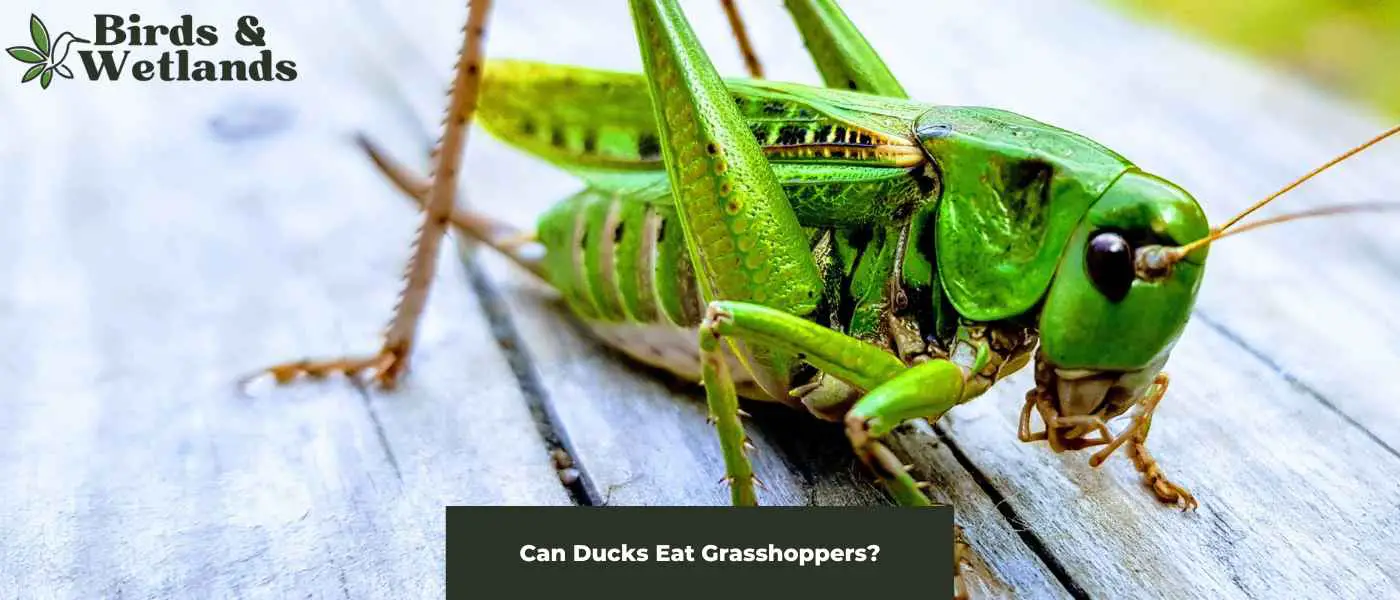Ducks are highly adaptable to their environments. They live in a wide range of habitats including the dry deserts, cold north and wet tropics. They are known for their foraging ability, which means that they are able to search for and find their own food.

Yes, ducks can eat grasshoppers as they are a natural part of their diet. Insects like grasshoppers provide essential nutrients, such as protein, which is vital for a duck’s growth and overall health. Ducks will actively hunt and consume grasshoppers when they find them in their environment.
- Ducks will eat any type of insect including grasshoppers. This makes them a natural predator of these common garden pests.
- Ducks are relatively low-maintenance animals, so they can be a convenient way to control pests without resorting to harmful chemicals.
- Ducks raised as farmstead companions can be a great way to keep your small garden free of insects, especially if you’re exploring creative solutions to solve pest problems.
What Are the Nutritional Benefits of Eating Grasshoppers for Ducks?
Grasshoppers are a low-fat, high-protein food source that is especially beneficial for ducks. In addition to providing essential nutrients, grasshoppers are also a good source of B vitamins, including thiamin and vitamin B12. These vitamins are important for maintaining duck health, and they can also help to prevent duckling mortality.
Furthermore, grasshoppers are a good food source for ducks during the molting process. Molting is a natural process in which ducks shed their old feathers and grow new ones. During this time, ducks need extra protein to help replenish their feathers. Grasshoppers can provide this essential nutrient while also helping to keep ducks healthy and active.
Can Ducklings Eat Grasshoppers?

Yes, they certainly can. In fact, it’s not unusual for young ducklings to start foraging for food alongside their parents from a very young age – and that includes grasshoppers! Grasshoppers are a good source of protein and other nutrients, so they can help to support a healthy diet for ducklings.
FAQs on What Ducks Love to Eat
Can Ducks Eat Crickets?

Ducks are often kept as pets or for farm yards. Many people choose ducks because they are relatively low maintenance and provide interesting company. One of the key aspects of duck care is providing them with a healthy diet. While most ducks enjoy a diet of duck food, some people also choose to feed their ducks crickets.
Crickets are a good source of protein and other nutrients, and they can help to supplement a duck’s diet. However, it is important to note that not all ducks can eat crickets. Some ducks may simply not like the taste.
What Are the Benefits of Using Ducks as Pest Control?
Many people raise ducks for egg and meat production. But what many people don’t know is that ducks can be effective in controlling some common pests found in gardens.
Like free-range chickens, ducks such as Indian Runner ducks have been welcomed in many ornamental and edible landscapes. Garden-raised ducks have become a popular form of natural pest control. They are quite effective at controlling some of the most common farm pests populations.
Ducks fly which means they can cover ground when foraging for food including insects. Since they’re not picky eaters, you can save money on pesticides because the ducks will eat insects and other pests in the garden such as slugs, snails and mosquitos. This means you don’t have to result in drowning slugs or handpicking beetles and insects from the plants in your garden.
Gardeners and farmers can benefit from the duck’s ability to stop mosquitoes at the non-feeding pupa stage as well. And unlike chickens, you can easily keep ducks in a duck yard pen.
Finally, a duck’s manure and feathers provide valuable plant food for your crops and plants. Worms love to eat the molted feathers of ducks and turn them into fertilizer.
Do Ducks Eat Beetles and Bugs?

Ducks eat battles and bugs including potato beetles, June bugs and the Japanese beetle. They are also known to feed on Japanese beetle larvae.

